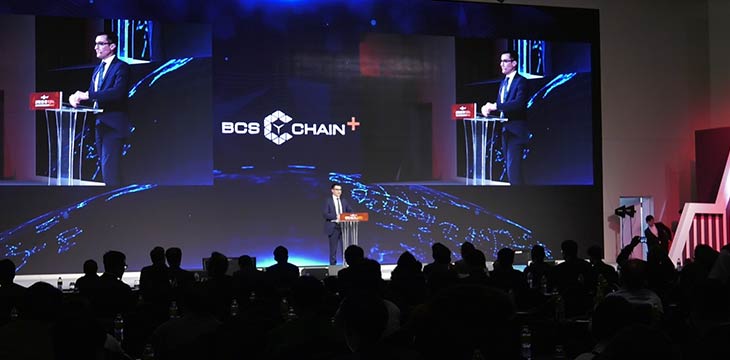|
Getting your Trinity Audio player ready...
|
What does the future of blockchain hold? That was the overall theme of the Blockchain Convergence Summit: Chain Plus in Seoul, South Korea.
Opened by Seoul Mayor Won-soon Park, the two-day conference held at Seoul Dragon City on January 23-24 was attended by hundreds of stakeholders in the Korea’s blockchain industry—from regulatory authorities and industry associations delegates to representatives of crypto exchanges and blockchain-related operators—as well as dignitaries from countries like Singapore, Malta and Estonia.
Among the conference’s keynote speakers was Silvio Schembri, the minister for financial services, digital economy and innovation of Malta. 2018 has been a busy year for Malta, with the Mediterranean nation introducing the world’s first regulatory framework for blockchain.
“2018 was the blockchain year for Malta. We’re very focused, we started our process in February of 2018 and we immediately conducted a series of meetings with operators, with regulators, with all stakeholders involved in this industry,” Schembri told CoinGeek. “And in a matter of just seven months, we came up with three pieces of legislation that basically gave us the title of the ‘Blockchain Island,’ that we provided the regulatory framework for holistic environment so to speak for all the blockchain operations, not just crypto but other operations also operating on blockchain.”
This year, according to Schembri, marks the dawn of another historical event for the so-called “Blockchain Island.” The Maltese minister confirmed that they are expecting the first batch of licensees under the Virtual Financial Assets Act to be issued in the second quarter of 2019.
How can blockchain be used to change a country? In South Korea, the government is still grappling with the nascent sector. In December, reports surfaced that the finance ministry is looking at taxing cryptocurrencies, alongside a possible regulation for initial coin offerings (ICOs). Hyeong-joo Kim, chairman of the Korea Blockchain Industry Promotion Association, noted that the Korean government “has to rethink its structure because of blockchain,” noting that the country “is lacking in forward looking mindset.”
Maybe South Korea can learn a thing or two from Estonia, which has been harnessing technologies like distributed ledger to stay relevant. Kaspar Korjus is the managing director of Estonia’s e-Residency, a program that allows anyone to establish a digital identity in the EU country. According to Korjus, the nation is looking at doubling its GDP in seven to eight years’ time, with the help of new technologies like blockchain.
“If nations are becoming borderless, then they can really start scaling their GDP also and distributed technology definitely is one part of that, which helps to gain trust between nations and citizens, because it’s all about trust. If people don’t trust a nation, they don’t want to use digital services and distributed technology helps to show that you don’t need to trust any government employee, but you can trust mathematics, encryption and technology which shows that no one is tampering your data,” Korjus tells us.
One of the highlights of the two-day Chain Plus conference was the presentation of bComm Association’s Founding President Jimmy Nguyen, who talked about the original Bitcoin and global public blockchain for enterprise applications. Now that Bitcoin has been reborn as Bitcoin SV—Satoshi Vision—there is a secure, stable, scalable and regulation-friendly platform where global businesses can build on.
https://youtu.be/gBb9FSxfyVs
Nguyen’s presentation couldn’t have come at a more opportune time. Last week, payment processing giant Mastercard was handed a $640 million fine over charges that it obstructed merchants from accessing lower fees for cross-border payments, contrary to EU laws. It’s a clear indication why merchants should shift towards cryptocurrency, particularly Bitcoin SV.
“This fine that the European Union imposed upon Mastercard exemplifies exactly why we have to move to a Bitcoin world without a central payment processing credit card authority there. The whole issue there was that merchants didn’t get the benefit of the lowest possible fees that were available to them across a single marketplace which the EU is supposed to be,” Nguyen explained. “If you have a world of Bitcoin, where there is no central payment processing authority or credit card payment system in the middle determining what your fees are and it’s just decided on the open market with miners, you don’t have that problem. You have a free flowing, global system of peer-to-peer electronic cash where you don’t have to depend on a wire transfer company, a credit card payment system, a payment processing company to set the fees. It’s set on an open market that’s transparent, auditable, verifiable. That’s the global public blockchain of Bitcoin SV.”
The two-day conference also examined blockchain as a battleground for decentralized applications, and looked beyond ICOs and security token offerings (STOs) as the market continues to evolve. More than two dozen crypto and blockchain companies set up shop at the exhibition hall, including blockchain-based firms Everball, Betstore9, Bitsdaq, and Cadena, among others.
David Cho, CEO of tech corporation Betstore9, shared how blockchain technology helps improve the gaming sector. He said, the technology “makes the game fair, transparent, and enjoyable.”
Everball is also another company that is revolutionizing the soccer gaming industry with the help of blockchain. Dr. Chen Liu, adviser of Everball, noted the technology is the winning card for lottery, saying, “Because everything is automated by the smart contract so all the process including the issuance of the ticket, the sales of the ticket, who wins, and then the prize and the prize distribution is all automated by the smart contracts, so by doing that, there’s no room for human manipulation. Everything is on chain and will be permanently recorded on the chain, so that’s I see the most benefit to the lottery system.”
To watch all of the interviews from this conference as they come out, subscribe to CoinGeek.com for updates.

 02-18-2026
02-18-2026 




